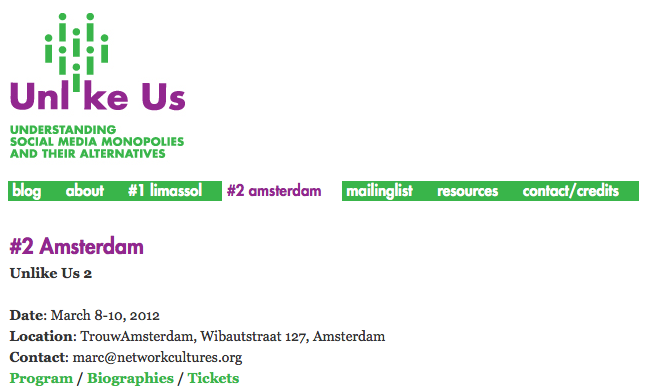I just got an email that the abstract for my talk “Defining Algorithmic Ideology: Using ideology theories to understand and critique corporate search engines” has been accepted for presentation at the Critical Social Media/Information Society Conference in Uppsala. The keynote speaker line-up is impressive including Vincent Mosco, Andrew Feenberg, Charles Ess, Christian Fuchs, Trebor Scholz, Ursula Huws talking about “Virtual Work and the Cybertariat”, and many more… I’m sure it’s gonna be an exciting event & I’m glad that I’ll be part of it! 🙂 Also, going back to Sweden in spring will be great! – I hope to see Mike Frangos there too!!! Anyone else? Just drop me a line..

& that’s how I’ll use critical theory to define Algorithmic Ideology:
Corporate Internet technologies like Google, Facebook and co. have been described as mirroring the “Californian Ideology”. Google, in particular, has been interpreted as a paradigmatic example of a company deeply rooted in the economic culture of Silicon Valley with a strong belief in information technology and the free market. While the concept of the Californian ideology helps to understand this newly arising techno-fundamental business culture, it fails to critique corporate search engines and their capitalist ideology. Big, universal search engines should not merely be seen as technical solutions for societal problems, as they often are – most importantly by Google itself – but rather as incorporating a “new spirit of capitalism” (Boltanski and Chiapello 2007) and exploitation schemes that come along with it. Previously, I coined the term “algorithmic ideology” to show how the new capitalist spirit gets inscribed in search engines by way of social practices.
In this paper I aim to define the term algorithmic ideology. Drawing on critical theory I argue that ideology could be a valuable tool to understand and critique the commercial dimension of search algorithms and their power in contemporary society. Following Althusser (1971), for example, I exemplify how the capitalist ideology gets materialized in corporate search engines and algorithmic business models. Through their algorithms corporations like Google exert their power, indoctrinate users, and create desire. By providing their services for free (and collecting user data instead) they extend their hegemony (Gramsci 1971) by attracting and integrating users in their “capital accumulation cycle” (Marx 1867, see also Fuchs 2011). In turn, user communities may be seen as (unconsciously) practicing and stabilizing the capitalist ideology by incorporating search services in their daily online routines and turning to Google & co. for advertising and consumer purposes. This way the “culture industry” (Horkheimer and Adorno 1969) and its ideological superstructure are inscribed in, transformed, and spread through supposedly neutral search algorithms.
This analysis points out how ideology theories could be used to develop a notion of algorithmic ideology encompassing materiality, institutions, and practices anchoring and reproducing contemporary capitalism. Instead of a mere belief in technology and global business, algorithmic ideology should function as an analytical framework to analyze and critique corporate search engines and the social order they perpetuate. Only when understanding how present-day search engines further global capitalism resistance and strategies for achieving alternative algorithms for a mores sustainable and democratic information society could be developed in the future. Whether a “radical repoliticization of the economy” (Žižek 1999) may be a first step into this direction and what role the state could/ should play in this undertaking will be finally discussed.
——————————-//
This research is carried out as part of the project “Glocal Search. Search technology at the intersection of global capitalism and local socio-political cultures”, funded by the Jubiläumsfonds of the Oesterreichische Nationalbank (OeNB).
Althusser, L. (1971) Ideology and Ideological State Apparatuses, in: Lenin and Philosophy and other Essays.
Boltanski, L. and E. Chiapello (2007) The new spirit of capitalism.
Fuchs, C. (2011) A contribution to the critique of the political economy of Google, Fast Capitalism 8(1).
Gramsci, A. (1971) Selections from the Prison Notebooks.
Horkheimer, M. and T. Adorno (1969) Dialektik der Aufklärung.
Marx, K. (1867) Capital: Volume I.
Žižek, S. (1999) The Ticklish Subject.
 Confirmed speakers and presenters: David M. Berry (UK), Frederik Zuiderveen Borgesius (NL), Philipp Budka (AT), Thomas Chenesau (FR), Jodi Dean (USA), Carolin Gerlitz (UK), Seda Guerses (TR/BE), Spideralex (ES), Anne Helmond (NL), Eva Illouz (IL), Walter Langelaar (NL), Ganaele Langlois (CA), Carlo v. Loesch/lynx (DE), Caroline Nevejan (NL), Arnold Roosendaal (NL), Eleanor Saitta (USA), Max Schrems (AT), Elijah Sparrow (USA) and James Vasile (USA).
Confirmed speakers and presenters: David M. Berry (UK), Frederik Zuiderveen Borgesius (NL), Philipp Budka (AT), Thomas Chenesau (FR), Jodi Dean (USA), Carolin Gerlitz (UK), Seda Guerses (TR/BE), Spideralex (ES), Anne Helmond (NL), Eva Illouz (IL), Walter Langelaar (NL), Ganaele Langlois (CA), Carlo v. Loesch/lynx (DE), Caroline Nevejan (NL), Arnold Roosendaal (NL), Eleanor Saitta (USA), Max Schrems (AT), Elijah Sparrow (USA) and James Vasile (USA).


